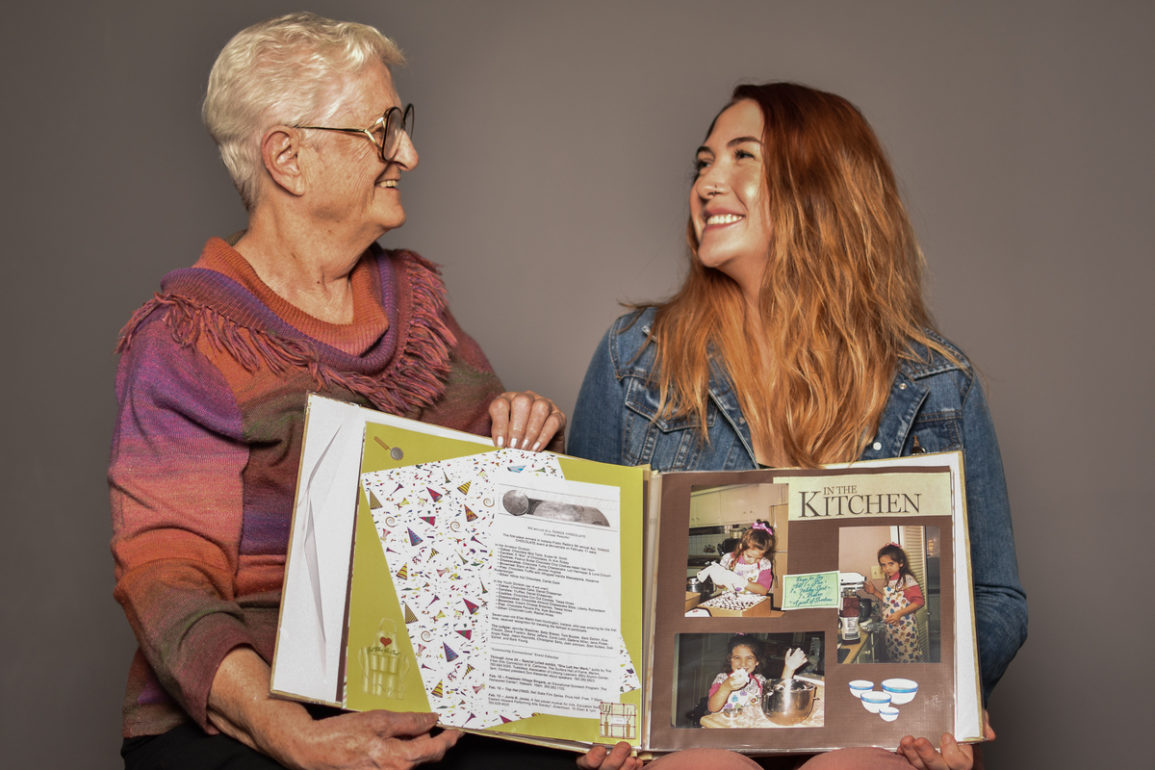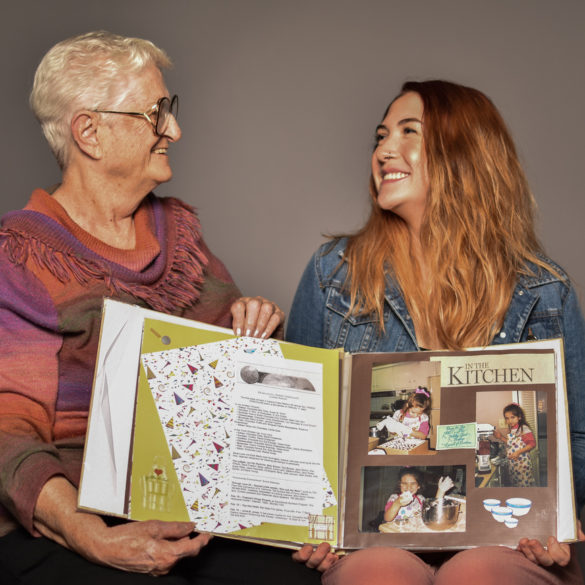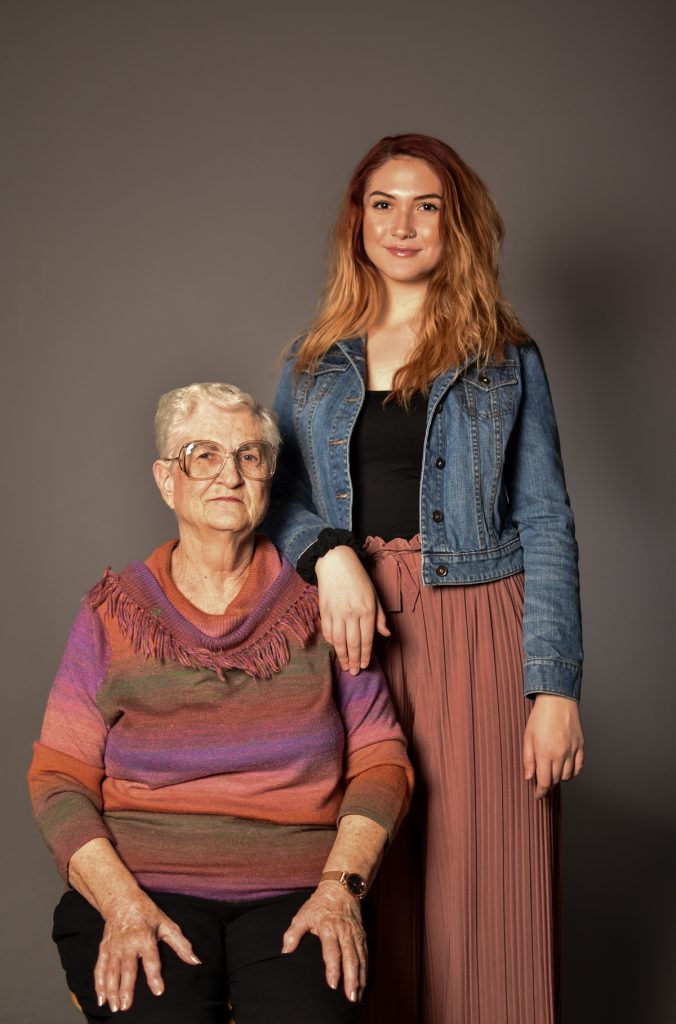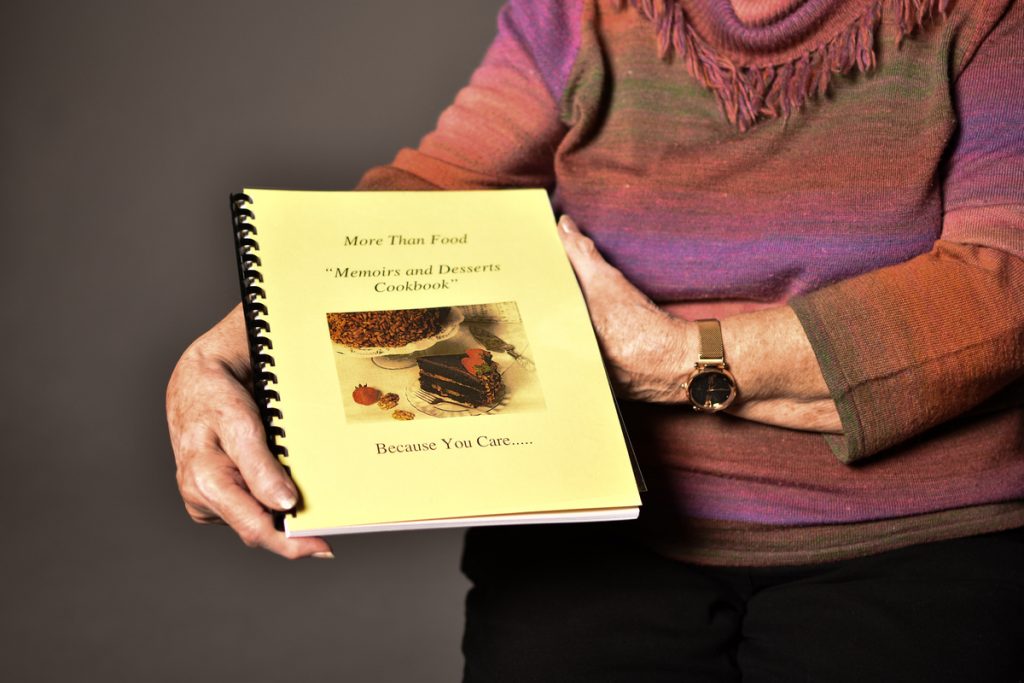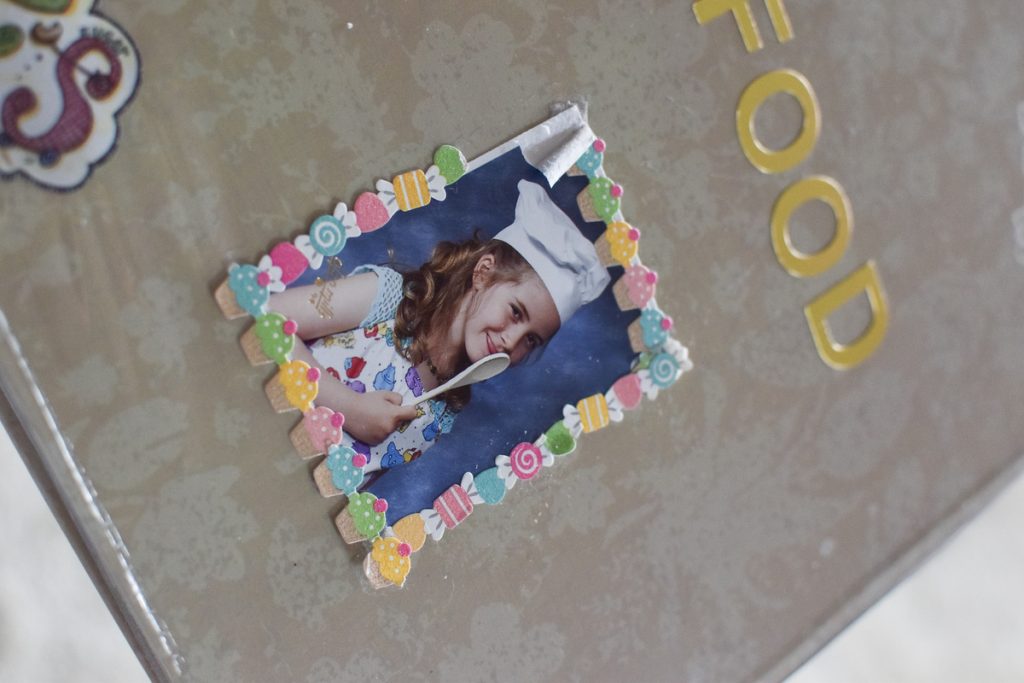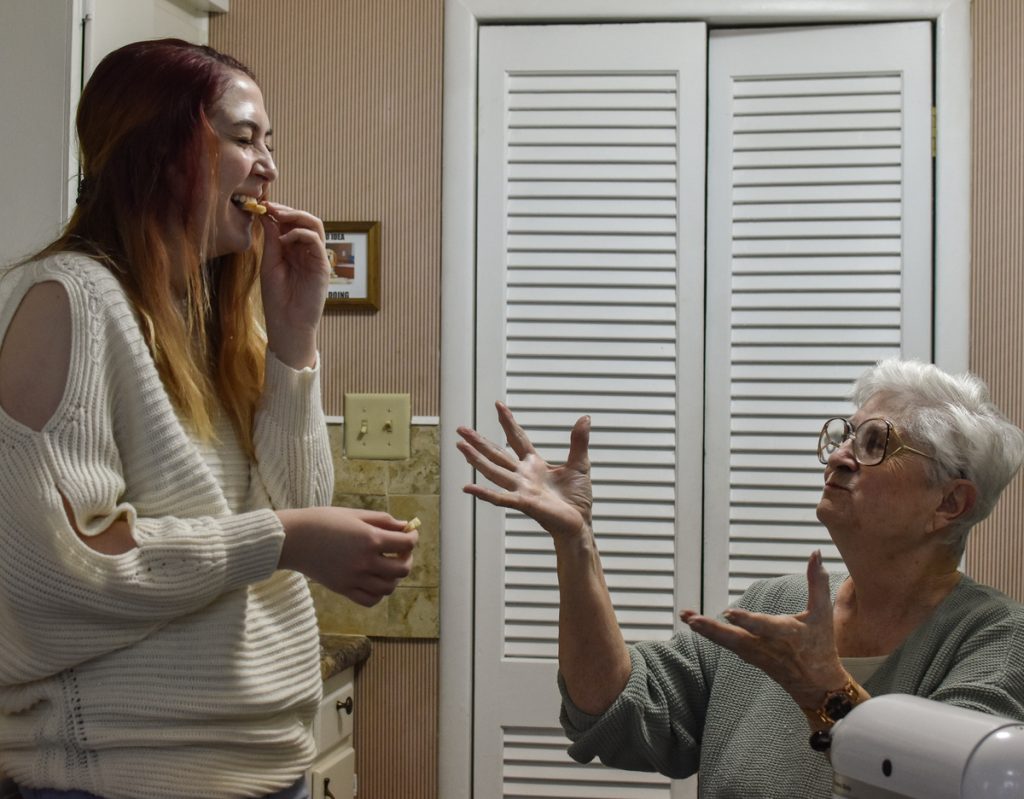Generation Z and the Silent Generation share many of the same values. What does this mean for our future?
Dianne Hines and Tessa Hines sit in Dianne’s living room. Dianne’s cat, Callie, sleeps at her feet on a big dog bed. Though everything is peaceful now, this house has seen quite a bit in the 61 years Dianne has lived here.
For Dianne, the most important memories come from family. She says she always wanted the most for her kids. She wanted her daughter, Sharon, to be a famous singer because she was talented at music. She wanted her son, Jon, a football player, to be in the NFL. She wanted her youngest daughter, Shirley, to be a model, because she was beautiful.
She said she never wanted her kids to grow up feeling like she never believed in them; though she wouldn’t know what to do with herself if they actually became famous.
“I couldn’t handle it if one of my kids actually hit the big time, because I would have gnawed my nails clear down to my wrist,” she says.
Tessa, 19, and her grandmother Dianne have always had a special relationship. Dianne took Tessa to preschool everyday while her parents worked. They would sing together in the car, making up their own songs and repeating them over and over.
Let’s go this way, not that way
Thataway only leads to home
They sang Somewhere Over the Rainbow, too, making up the words they didn’t know.
Tessa was born in 2000, right at the beginning of the new millennium. She was 1 when 9/11 happened. She was 8 when the Great Recession hit.
Dianne was born in 1934, right in the middle of the Great Depression. She was 12 when World War II ended. She was 36 when the United States landed on the moon.
Dianne is from the Silent Generation. Tessa, Gen Z. And though they may seem completely different, they’re more alike than you think.
As Generation Z begins to grow up, they are defining their own set of values that impact the way they see and interact with the world, yet many of these values are similar to the Silent Generation. The oldest members of Gen Z are in their early 20s, the oldest Silent Generation members are in their 90s, yet both generations are risk averse, self-sufficient, and optimistic. How is it that two generations nearly a century separated from one other can hold similar values?
Ellen Whitehead, assistant professor of sociology at Ball State University, says life events play a big role in determining what traits a generation will have: the political climate, national events, and big issues like climate change all have an influence on how generations respond to the world around them. Gen Z and the Silent Generation have experienced similar national life events, which may be influencing some of their shared traits.
I Fought
One of the reasons the Silent Generation and Gen Z are alike is because they experienced similar events in their childhood. They both went through periods of economic turmoil. For the Silent Generation, it was the Great Depression. For Gen Z, the Great Recession.
The Recession meant that many Gen Z kids saw their parents lose their jobs, and this event left a lasting impression on them.
Tessa’s dad worked for Borg Warner, but he lost his job when the company closed in 2009. Her dad had worked there for 28 years. She remembers going to school and feeling jealous that some of her classmates were completely unaffected by the recession while she had to struggle financially.
Because of this, Gen Z wants to be practical when it comes to spending, and considers financial independence a crucial personal goal. A report by Accenture found Gen Z’s priorities are to get a stable, well-paying job after college. Additionally, 83% of recent Gen Z college graduates said they chose their major based on how likely it would lead to a job after graduation.
Tessa considers herself a saver. Her dad tells her all the time to make sure she has a plan for her future. He always told her to sign up for a pension at her job as soon as she could. She grew up knowing the term 401k. She’s practical with her money, and though she admits to an occasional splurge, financial independence is her top priority.
“I want to make enough money to even exist and live,” she says.
For Dianne, growing up in the Great Depression was hard, but she says she knew she could make it through. Her mother was a school teacher, and her father was a babysitter. He stayed home with the kids, and they lived off of the half-days her mother worked to support them. She was the only working mother in Dianne’s class.
Dianne was not a girly girl. Not by a long shot.
“As a kid, see, I fought,” she says. “I was a physical fighter, the cheating kind.”
Dianne was tough. She had to be. Her brother was timid and she had to defend him. She describes herself as a tomboy to the highest degree, and if any boy dared to tease her for being a girl, he would get a punch to the face.
The times Dianne grew up in were tough, too, but she says that she didn’t really notice that anything was hard.
“We were poor, but nobody knew they were poor because everybody was in the same circumstance,” Dianne says.
When Dianne was young, she had five dresses in her closet for school, and that was pretty much the extent of her wardrobe. She remembers going to the grocery store with ration coupons for things like sugar and gasoline. When she was in grade school, her class went on a field trip to a literal field to pick milkweed pods to make parachutes. It was just part of her family’s routine. It was everyone’s routine.
I will
Another similarity between Gen Z and the Silent Generation is their desire to be self-sufficient. A 2016 poll by Gallup found 41% of students wanted to start their own business one day. An additional 45% believe they will one day invent something that changes the world.
The Silent Generation is known for its work-ethic. A report by Gallup found 42% of the Silent Generation that are still working are engaged in their work. This is the highest percentage across 4 generations. A 2010 report by Pew Research describes the Silent Generation as taking comfort in conformity and being civically inclined, which may help when it comes to their dedication in the workplace.
Dianne ran her own catering business, More Than Food. She got the idea when she was an assistant to the pastor of her church. She got calls all the time from people asking if she knew anyone who could cater their wedding. She realized there was a need in her community. One day, someone called with that familiar question: do you know anyone that can cater a wedding?
I will, Dianne finally said.
So More Than Food came to life. But what she name her business More than food?
“Because I felt like I had Jesus to offer, besides offering food,” she says.
Dianne started her business originally with a partner, but after 6 months she decided to buy her out. After that, she was on her own. Dianne did everything right, making sure her business was up to code. She couldn’t work out of her house, a Department of Health regulation, so she used her brother’s trailer, renovating it and making sure it had all the proper facilities. All that was left to do was bake.
And boy, did she ever bake.
She made six-tiered wedding cakes. She made huge baskets decked out in flowers, ribbons, and fake grapes. She made cakes that look like basketballs, dogs, snowmen. She made candies and cookies and pies and chocolate-covered 2 pound apples.
When she outgrew the trailer, she renovated her garage. She had everything: a walk-in freezer, a huge table for making cookies, a professional chocolate tempering machine.
Not only was she the baker, she did everything on the business side herself. And this wasn’t just one-time wedding jobs, either. She was a wholesale bakery. She made exclusive desserts for restaurants, and went through wholesale companies to sell her cookies. She shipped out her desserts all across the east coast. Her husband, Bob, had to build shelves into her car so she could take 30 to 60 pies every weekend to a restaurant. She finally had to hire some help when she moved to the garage.
She even had a storefront for a while, but she stopped when she felt it was time to retire. By this time, she was over 65, and working 60 to 80 hours a week. She has a bed upstairs in the garage for when she pulled all nighters.
So she hung up her apron, but she wasn’t done. Dianne wrote a book about her experiences, titled “More Than Food: Desserts and Memoirs.” She published it in 2009 and sold a few hundred copies to former businesses she worked with.
The book includes memoirs of her time running her own business, pictures of some of her best creations, and recipes for when you inevitably get hungry after looking at all the photos and need to make all the desserts for yourself.
“This book was not for the world,” she says. “I did it for my grandaughters.”
Tessa has read Desserts and Memoirs. She’s even featured in it; there’s a photo of her as a toddler, frosting some cookies. True to her form, Dianne dressed her up in a chef’s hat, apron, and wooden spoon for another photo and had her portrait professionally taken.
Tessa has good memories of baking, because it was something she and Dianne did together often. From the age of 3, Dianne taught Tessa how to crack an egg with one hand. She taught her how to make chocolate and enter it into competitions. Tessa won her first chocolate competition at age 4.
Gen Z likes to work with their hands and be creative. A report by JWT Intelligence found 77% of Gen Z say they do something creative with their free time, such as painting, drawing, or playing an instrument.
Whitehead agrees. She says Gen Z is a contradiction of sorts.
“On one hand, they’re portrayed as very entrepreneurial. On the other hand, they’re portrayed as very cautious,” she says.
Taking after her grandmother, Tessa’s has a self-sufficient spirit of her own. She graduated early from high school, already knowing what she wanted to do. All those years of dressing up with her grandmother had a profound effect on her; she wanted to take her interest in makeup and skincare and turn it into a career, so she went to cosmetology school right out of highschool. At just 19 years old, she’s already working as a licensed esthetician. She landed a job in Carmel and says she absolutely loves it.
“I’m starting to realize I’m young and I’m going into the real world sooner than a lot of people my age because I have a career now,” Tessa says.
Tessa, who credits her love of music to Dianne, used to sing the national anthem at Ball State games. Once, when she was warming up, a boy from the opposing team was so enchanted by her voice that he came over and proposed to her. At the time, Tessa was confused and a little weirded out, but she laughs about it now.
She says she’s always had an independent spirit. It used to intimidate the boys she dated.
Dianne was the same way with her husband. Bob was a practical man. He was a money saver, a news watcher, a why-go-out-when-we-have-ice-cream-in-the-freezer type of guy.
In their marriage, which lasted 64 years, Dianne says she took on the role of the decision maker. Bob looked to her for direction in social situations and he let her do whatever she wanted, for the most part. Dianne only remembers him telling her no twice in their marriage. Once, when she wanted to buy an expensive toy for one of her grandchildren, and another time when she wanted to move to Florida.
“He built this house, and I think he probably hammered one of his thumbs in it or something,” Dianne says.
[embedyt] https://www.youtube.com/watch?v=2PmAi0cnvis[/embedyt]
I Want More Than That
The last characteristic shared by both generations is optimism. A report by Vision Critical found that 88% of Gen Z say they feel optimistic about their future. In a 2016 Gallup poll, Gen Z described their happiness level at 8 out of 10. This number has stayed fairly consistent over a period of four years.
The Silent Generation ranks high on the happiness scale as well. A 2013 report by Prosper found the Silent Generation was the happiest out of all the generations surveyed.
This doesn’t mean that both generations aren’t realistic when it comes to their future, however. The Silent Generation and Gen Z have practical attitudes when it comes to their outlook on life. And though they may feel satisfied with themselves, the state of the world is a separate issue.
A 2019 report by Pew Research examined American’s outlook about what the world might look like in 2050. The results weren’t very favorable. Over half of adults 18 to 29 cited climate change as a great concern. Mental health is an issue for Gen Z as well. According to a study by the APA, 62% of Gen Z say stress over climate change has affected their mental health.
However, Gen Z is more likely than any generation before it to seek help from mental health professionals, according to the American Psychological Association.
Whitehead says that Gen Z has a lot on their plate, growing up in an age of political division and believe they have a responsibility to fix climate change.
Tessa says she considers herself an optimist. She’s concerned for the state of the world, climate change being especially important to her. And like many others in her generation, she struggles with her mental health. Even though she has anxiety and depression, she says she doesn’t have a cynical outlook on life.
“I can’t be put in that state of mind for so long because It’ll just bring me down more, so I’ll put it out in the world and talk about it,” she says, “Talk about how it affects me and how I can help other people.”
Dianne is the same way. She’s never been a fan of the 24-hour news cycle, even though some days that’s all Bob would watch. Too much negativity, she says. She’d rather watch a news story once, to be informed, and leave it at that. She never gets into politics, either, even online.
“On Facebook, if anyone wants to be my friend I say ‘this is what I do: I do flowers, I do scenery, I do kitties and dogs. No politics or nothing negative,’” she says.
Tessa says she combats her feelings of fear about the state of the world with action. Inheriting some of Dianne’s fighting spirit, she enjoys activism and being vocal online when it comes to political causes and social justice.
She says that younger generations can’t blame older generations for all their problems.
“When you start blaming, you’re not doing. You just got to do,” she says, “you’ve got to do it yourself. You’ve got to help.”
Dianne says she’s excited for the future, especially when it comes to her kids and grandkids.
“I just want so much for them,” she says, “And it’s more than just ‘Oh I’m just happy if they’re healthy.’ No, I want more than that. I want joy, I want them to love what they’re doing and to be successful,”
She adds, “And what can I do to help them? I can send them a care package of cookies.”
She and Tessa both crack up.
Dianne and Tessa are very different. The worlds they grew up in are different. And yet, as Dianne sits in her house, staring across the room at Tessa, she can’t help but feel a little bit confused.
“She sounds very much like me, and yet I didn’t teach her any of these things,” she says.


